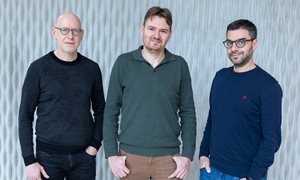
Radboud university medical center and Erasmus MC start a study investigating the effectiveness of a new surgical treatment after intracerebral haemorrhage. The Netherlands Health Care Institute has designated the treatment as ‘Promising Care’ and awarded a 5 million euro grant for the project.
Every year, more than 6,000 people in the Netherlands have an intracerebral haemorrhage. An intracerebral haemorrhage is the most serious form of stroke: four out of ten patients die within a month, and of those who survive, most remain dependent on care. Currently, there are few effective treatments. Surgical removal of the haematoma by means of craniotomy does not increase the chances of a good recovery.
In recent years, a new type of surgery has been developed for patients with intracerebral haemorrhage: minimally invasive endoscopy-guided surgery. In this treatment, the intracerebral haemorrhage is removed with keyhole surgery through a small hole in the cranium. Through that small hole, the blood is removed. Recent research shows that this procedure is safe and that it succeeds in removing on average almost 80% of the cerebral haemorrhage. The operation must be performed within eight hours of the onset of the first symptoms.
The awarded grant of 5 million euros enables the study of the new surgical procedure to determine whether it improves outcome of patients after intracerebral haemorrhage. In addition, the grant will carry the costs of the promising treatment, as the procedure is currently not yet compensated through the health care insurance system.
Karin Klijn, Professor of Neurology at Radboud university medical center: "We are very pleased to be able to conduct this study. If we show that this treatment really is beneficial for patients, for the first time we would have an effective treatment for this serious condition.'
Ruben Dammers, neurosurgeon at Erasmus MC: 'The results with this operation within 8 hours of the onset of symptoms are promising and it is great that we can now do this study together with neurologists and neurosurgeons.'
Collaboration between neurologists and neurosurgeons from all over the Netherlands
For this study neurologists and neurosurgeons from eleven neurosurgery centers and surrounding hospitals throughout the Netherlands will be collaborating. In addition to investigating whether the new operation also leads to better recovery, compared to the standard treatment, the affordability of the treatment will be investigated. The full name of the project is 'Dutch Intracerebral Hemorrhage Surgery Trial; Minimally-invasive endoscopy-guided surgery for intracerebral hemorrhage: Analysis of Budget-impact and Cost-effectiveness (DIST-ABC). DIST is also supported by an unrestricted research grant from Penumbra Inc.
The study is part of CONTRAST: Collaboration for new treatments of acute stroke. This consortium is supported by the Dutch Heart Foundation and the Dutch Brain Foundation.
-
Want to know more about these subjects? Click on the buttons below for more news.
More information
Pauline Dekhuijzen

wetenschaps- en persvoorlichter





